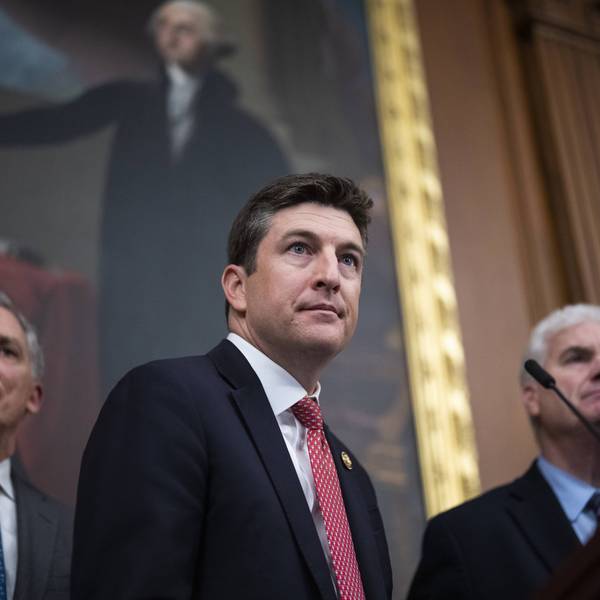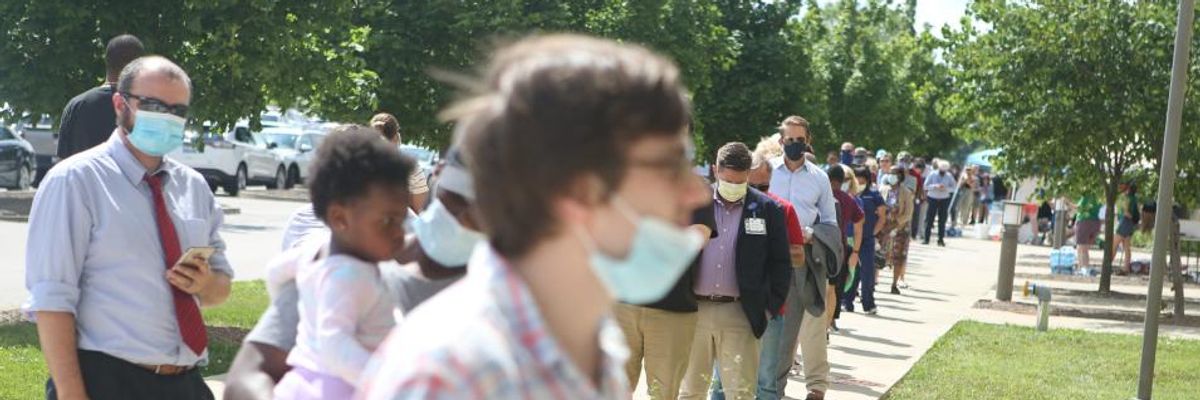Video footage of Kentuckians pounding on the doors of a closed Louisville precinct demanding the right to cast their ballots in the state's primary contest on Tuesday was cited by voting rights advocates as an alarming portent of what could unfold in November's general election if steps aren't taken to confront America's nationwide crisis of voter suppression.
"This is what voter suppression looks like," tweeted advocacy group Indivisible in response to a viral video showing dozens of prospective voters banging on the doors of Louisville's lone in-person polling site after the precinct closed at the 6 pm deadline.
Kentucky election officials, citing public health risks posed by the coronavirus pandemic, slashed the number of polling locations open Tuesday from 3,700 on a typical election day to just 170.
Voters who stayed in line at the Louisville precinct after the doors closed were ultimately let inside after progressive Senate candidate Charles Booker secured a court order extending the deadline to 6:30 pm, but not before the troubling scene was captured on video:
Rights groups said voting issues Kentucky--as well as the long lines and voting machine malfunctions that plagued the New York primary on Tuesday--are just more evidence that states and Congress must act immediately to remove barriers to the franchise and expand voting options before November.
"Today shows that vulnerable communities face barriers to the vote," tweeted Kristen Clarke, president and executive director of the Lawyers' Committee for Civil Rights Under Law. "Long lines, late poll openings, and more show voter suppression is a threat to democracy."
Richard Beliles, board chair of Common Cause Kentucky, said in a statement late Tuesday that "the shortage of poll workers led to a shortage of polling places which made it harder for poor and disabled citizens to get to the polls."
"That is a shortcoming that must be addressed," said Beliles. "We need to offer no excuse absentee voting for the general election and we need to build in enough time to get those requests in and mailed back to voters in plenty of time to vote."
Common Cause New York executive director Susan Lerner said that while the New York Board of Elections did a "credible job meeting the overwhelming demand for absentee ballots and increasing polling sites for early voting... that does not excuse the outstanding issues we've seen today."
"We'll be following up aggressively to resolve them before the fall," said Lerner. "Common Cause NY is committed to making sure that the state hit hardest in the nation by the coronavirus has a full say in the presidential election this November."
Mother Jones senior reporter Ari Berman warned Wednesday that the voter suppression that has thrown 2020 primary elections into chaos in New York, Kentucky, Georgia, Wisconsin, and other states is likely to be amplified in November in the absence of substantial changes at the local and national level.
"A pattern of voting problems suggests that there will be major barriers to ballot access for the presidential election in November, when the coronavirus crisis is likely to be nowhere near over," wrote Berman. "One of the clear lessons from the primaries is to make sure there are enough polling places open, even as voters are encouraged to vote by mail."




